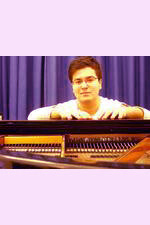
Florian Mitrea – the winner of The International Piano Contest in Vienna
Wednesday, 25 August 2010
, ora 13.45
Florian Mitrea is a young pianist born in Bucharest, in
1989. After graduading from George Enescu Music Highschool, during which time
he won important awards at The National Music Olympics, The Ada Ulubeanu National
Piano Competition and The Jeunesses Musicales Internatioanl Competition,
Florian Mitrea was accepted- in 2007-with a scholarship at The Royal Academy in
London, where he has been studying since September 2008.
During the spring of 2010, at professor Christopher Elton’s
recommendation, the Romanian pianist, together with the violonist Yuka Ishizuka
and The Academy Symphony Orchestra performed for the very first time Timothy
Jones’(doctor in musicology) final version of The Concert for Piano, Violin and Orchestra by Wolfgang Amadeus Mozart.
Florian Mitrea is also a very active chamber musician, often
performing with The Mitrea Piano Quartet, group with which he won The Harold
Caxon chamber music award, offered by the London Academy.
Last week, Florian Mitrea won the Grand Award at 10th
edition of The International Piano Competition in Vienna, organised by Panmusic
Austrian Foundation and The University of Music and Performing Arts in Vienna.
In the following interview, pianist Florin Mitrea speaks
about this performance and also shares other information.
Mr. Florian Mitrea, you are the winner of The International
Piano Competition in Vienna. How important is this this award for your career?
I would say it is an important award at an internatioanal
competition where the participants have arrived from different countries, such
as Austria, Ukraine, Cyprus, Japan, Korea and, of course, Romania. It is an
award that means very much to me, especially because it opens my way towards some
recitals in the capital of Austria. I have already been invited to perform a
recital at The 2011 Summer Season at the Lobkowitz Palace and it sems that the
invitations are not going to stop here. The award is important because it opens
the door for other great competitions.
What you are saying is that you will continue going to
competitions?
Of course I will. Competitions are an important part of my
activity, they represent the way through which any young musician can start a
career based on concerting activity.
At the moment, you are a student at The London Royal
Academy. What type of activities are you developping there?
I have started studying there with a scholarship and, now, I
am a third year student at professor Diana Ketler’s class. Since I have arrived
here, I was given the chance to perform solos, I have won an award at a London
competition which gave me the oportunity to perform solo at St. James
Piccadilly Cathedral. I also perform a great deal of chamber music; I am a
member of Mitrea Piano Quartet, which is the official ensemble of The Royal
Music Academy on behalf of which we perform not only in London, but also
outside London. And with the violonist Raluca Matei of Trinity College of Music
from the Greenwich headquarter, I perform sonata recitals for piano duo and
violin both in Romania and in The United Kingdom.
Is the Romanian repertoire a choice in your activity?
Yes. I have performed Romanian music ever since I was a
student and I have talked about it with each oportunity I had- in The Small
Athenaeum Hall or during the Arcuș seasons presented live from Radio Romania. I
have performed Enescu’s , Toduță’s, Paul Constantinescu’s music and I intend to
continue doing it. I have even been named the winner of The Enescu Society
scholarship of The Romanian Cultural Institute in London and I will mostly
perform Enescu’s music, but also other Romanian composers’ music.
How is Romanian music received there, in Great Britain?
I could not give a
straightforward answer to this question. There are musicians who know very well
Enescu’s music, even composition professors from college who show a great
interest for Oedipe. On the other hand, Enescu’s piano music is not that famous
here. Of course, thanks to the untiring promoter of Enescu’s music -professor
Remus Azoiței- the world now knows the violin and piano sonatas, but piano solo
sonatas or suites are not that acknowledged here. I wish I did something to
change all this and I will try to play them everywhere I am given the chance to
do it.
When are you going to perform for the Romanian public?
I will return in November for The SoNoRo International Chamber Music
Festival. Together with my professor and other musicians, we will perform
Saint-Saëns’ Le carnaval des animaux on the stage of The Romanian Athenaeum. I
am also planning a recital at 'George Enescu' Philharmonic.
Interviewed by Larisa Clempuș
Translated by Cristina Mihaela Sandu and Andreea Velicu
MA Students, MTTLC, Bucharest University















